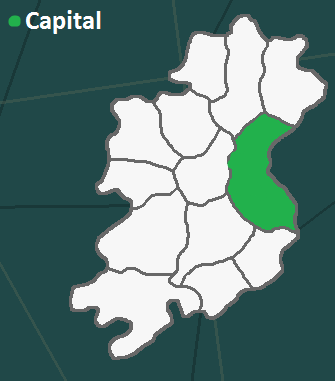Kingdom: ireland
The Kingdom of Ireland
Official Kingdom Positions
Regions of the Kingdom
- Dublin (Capital)
- Ulaid
- Tir-Loghain
- Tir-Connah
- Ziigo
- Mayd
- Galway
- Tuadmumu
- Desmumu
- Urmumu
- Laigin
- Osraigh
- Mide

News
- Competition drives the price of pork to an all time low.
- Richard Kane announced as the future Academy Director of Dublin.
- The Academy of Dublin hits its 50% construction milestone, prompting preparation for it's completion.
- Diarmid Rathian completes expansion of his Inn, currently Ireland's biggest producer of food. It is expected that he will likely take on an apprentice.
- Lord Corinthius Tyler completes the expansion of his Carpentry Workshop and is ready to take on apprentices.
Welcome to Ireland!
Ireland
The beautiful island of Ireland is situated to the extreme northwest of mainland Europe and west to the Kingdoms of Wales, England and Scotland. While its population is small, it produces large amounts of goods for consumption and export, allowing it to operate independently of any foreign imports or interventions.
History
Ireland presently operates under the Celtic rule of King Annan D'lochlain, son of Eve, Queen and Mother of Scotland in 1310, and his administration headed by Ireland's Lord Vassal - Lord Corinthius Tyler, first King and Father of England, son of Eve - Queen and Mother of Scotland, and King Annan's half brother. Despite different clan names, neither King Annan nor Lord Corinthius share Queen Eve's surname, for it was customary in Celtic tradition for the sons to adopt their Fathers name.
The island itself has been inhabited for around 8,300 years, the native inhabitants left huge stone monuments, many of them astronomically aligned. Ancestors of the current populace left behind elaborate gold and bronze ornaments and weapons. The island has a long history of warfare; dating back to the arrival of Celtic invaders who colonised Ireland in a series of waves between the 8th and 1st centuries BC. Those known locally as the Gael, are decedents of the great people who conquered Ireland and originally divided it into 5 separate Kingdoms with a common Celtic constitution.
In 432 AD, it is said that St. Patrick arrived on the island and brought the teachings of Teos to Ireland. Irish scholars excelled in the study of Latin and Teology within its monasteries that flourished, preserving Latin and the word of God during.
Language
Ireland is culturally rich in language for it speaks Irish, Latin and English as its main languages, although the majority of the population is ill-educated in all three.
